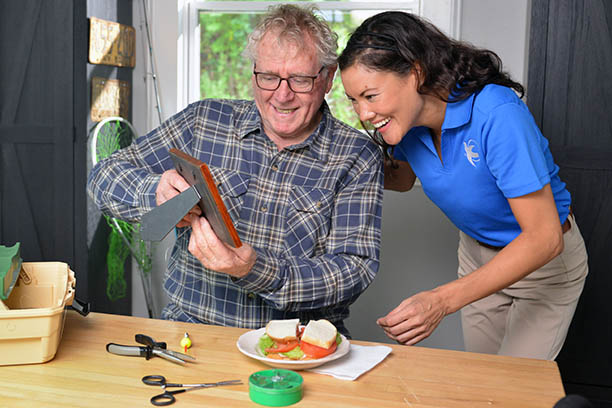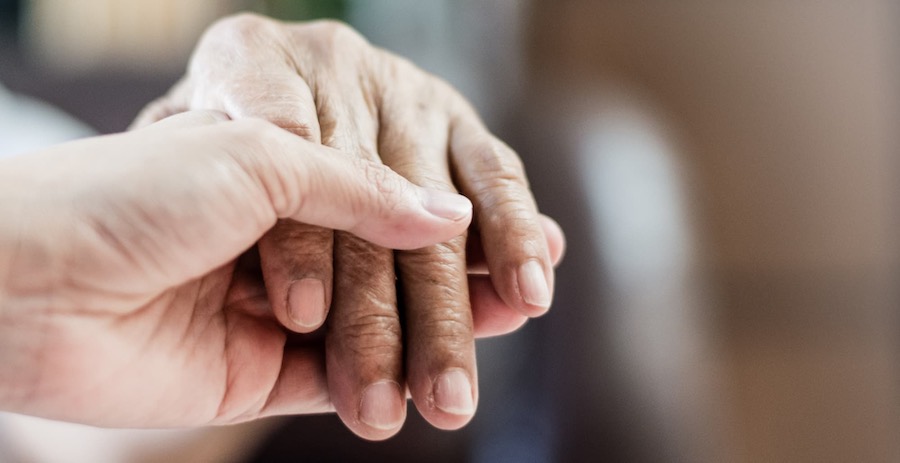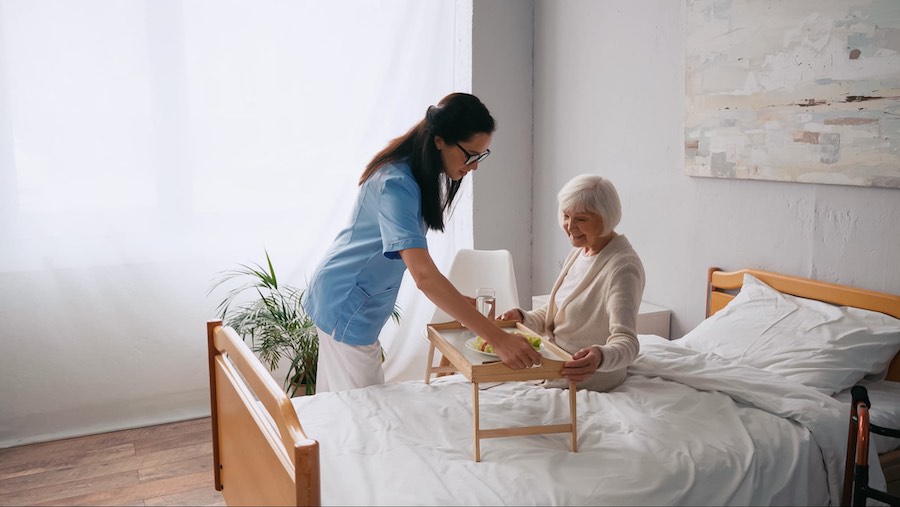Serving Midlothian, Richmond, Henrico and throughout the Southside neighborhoods of Brandermill, and Bon Air
Visiting Angels RICHMOND, VA
9019 Forest Hill Ave #1CRichmond, VA 23235
Phone: 804-423-6500
Fax: 804-505-8668

Senior Care in Richmond, VA
When aging becomes a challenge, many older adults find it harder to perform everyday tasks. While some families may choose to move their loved ones into nursing homes or assisted living facilities, this isn't always the best solution. Many seniors still deeply value their independence and the ability to live in their own homes. Relocating them to a care facility can lead to feelings of anger, sadness, or frustration, which can negatively impact their well-being and your relationship with them.
For those seeking to support elderly loved ones without uprooting them from their familiar surroundings, senior care in Richmond, VA offers a compassionate solution. In-home care services, like those provided by Visiting Angels Richmond, allow seniors to continue living independently while receiving the help they need with daily activities. Whether it's assistance with personal care, meal preparation, light housekeeping, or transportation, in-home care services ensure that older adults can maintain their dignity and quality of life.
Call us at 804-423-6500 to schedule your free senior caregiving services consultation today!
Aging is a natural part of life, but the aging process can sometimes bring difficulties. If you or a loved one is experiencing those challenges, then you've probably searched online only to find a wall of information. There are countless blogs, articles, and studies about aging. There is so much information out there it can be overwhelming. How do you know which sources are relevant or accurate?
Perhaps you're past the point of asking questions. You need answers— now. You're no longer looking for advice. You're looking for action. Unfortunately, many seniors and families react to aging too slowly. A bad fall, a hospitalization, or an emotional disaster launches you into crisis mode.
You want to provide the best for your family, but starting senior care is so daunting. Who can you trust? What's relevant? What kind of Richmond elderly care should you even be looking for?
About Visiting Angels Richmond, VA - Senior Caregiving Services
Our senior life care navigation guides you through your challenges. And our solutions.
Sometimes, you just need to sit down and talk to someone about your needs. That's what our care assessment does. A caregiver coordinator meets with you and the care recipient. We listen to your needs, your experiences, your troubles.
Having an in-person meeting with a caregiver coordinator from Visiting Angels is an excellent opportunity to ask questions. We're sure you have plenty of concerns and curiosities, and we'll do our best to address them. Our care coordinator often shares helpful resources on senior care in Richmond, VA.
The assessment grants us a deeper, more personalized understanding of your situation. We get to know your seniors, their preferences, activities, and hobbies.
During this in-home consultation , we can also conduct an in-home safety and fall risk assessment. Fall risks are the number one reason seniors lose their independence. We provide in-home senior caregiving services. There are a plethora of advantages to aging at home. However, families may fear aging in place because the place isn't safe. The safety assessment is part of the holistic elder care Richmond, VA, has come to rely on.
What do you get out of an assessment? At the assessment, we give you information about options, costs, and policies. We make recommendations and explain the path forward.
Ultimately, the goal of the assessment is to develop a caregiving plan. It's a roadmap that will guide caregivers. The assessment also settles logistics, such as access to the home and documentation. Once you decide to move forward with Visiting Angels, you can quickly begin our practical, personalized senior caregiving services.
As your loved one receives care, our caregiver can act as a liaison. They can provide communication to you and family members about your loved one’s current state. We also periodically check in with your loved one and their caregiver to ensure a satisfactory practice. They will notify you and our caregiving network of any changes so we can quickly adapt to any of life's challenges.
Senior life care navigation is more than a start. It’s guidance through this challenging family time. By talking to a care coordinator, you’re forging a path forward. You’ll receive relevant information and helpful resources. You’ll discuss caregiving options with an experienced professional. And you’ll gain a vital line of communication between you and a wider caregiving network.
With Senior Caregiving Services from Visiting Angels, Seniors Care in Richmond, VA and Surrounding Areas Can Get the Assistance They Need at Home
Visiting Angels provides in-home senior care in Richmond, VA and the surrounding areas. These services are personalized to meet the unique needs of each senior, helping them live safely and comfortably in a familiar environment without losing their independence. Visiting Angels’ dedicated and experienced team of caregivers will help your loved one maintain health and happiness at home.
Our in-home senior care in Virginia services include:
- Meal planning and preparation
- Medication reminders
- Light housekeeping, such as vacuuming, dusting, laundry and more
- Meaningful companionship
- Assistance with bathing, dressing and grooming
- Mobility assistance
- Transportation
- Overnight monitoring and assistance
- And more
At Visiting Angels Richmond, we understand that each senior’s needs are unique and can change over time. That’s why we offer flexible care plans that can easily be adjusted as your loved one’s situation changes. Whether it’s a change in health, mobility or daily routine, we’re here to ensure your family member continues to receive the personalized support they need today, tomorrow and for as long as they need it. We’re committed to providing care that fits their needs, so they can be comfortable and independent in the familiar environment of their home. Don’t hesitate to contact us today for a more detailed consultation.
How Our Senior Care in Richmond, VA - Can Help Local Elderly

We've gone through the initial assessment and what to expect afterward. But what about specifics? What is this senior care Richmond, VA, relies on? What kind of care is the coordinator— well— coordinating?
We provide a diverse range of senior caregiving services. Here is a brief overview of the services the care coordinator might discuss or recommend. Remember, these services are personalized to your loved one and can adapt to their changing needs.
- Alzheimer's Care. Approximately four million Americans ages 65 and over experience Alzheimer's as a type of dementia. Our goal is to mitigate symptoms, slow progression, and maximize the quality of life.
- Companion care. If your loved one lives alone or is isolated from their community, Companion care is a practical and compassionate solution. Companion caregivers employ a variety of non-medical techniques to support their care recipient's emotional well-being. This can include socialization, recreational engagement, and alleviating stress.
- Dementia Care. Dementia is an umbrella term for a number of neurodegenerative conditions. Similar to Alzheimer's care, our goal is to mitigate symptoms, slow progression, and improve quality of life.
- End-of-life care. Facing one's mortality is never easy. Our end-of-life care can ease that burden. We provide emotional, mental, and spiritual well-being through a variety of medical and non-medical support. Our goal is to increase the care recipient’s comfort so they may live the rest of their life in peace.
- Memory care. Memory care is generalized care that employs a variety of non-medical methods to maintain and improve memory. It can be used during the early stages of dementia to slow the progression of symptoms. It can also be fully utilized to help with the memory decline natural to aging.
- Palliative care. Palliative care is often confused with end-of-life care. Palliative addresses the symptoms and conditions of a terminal illness. Individuals can spend years in palliative care. Both offer emotional, mental, and spiritual support while maximizing quality of life.
- Personal Care. Personal care is a highly personalized service geared around your loved one's specific needs. It focuses on the everyday tasks the care precipitant struggles with. This can encompass everything from dressing to bathing to mobility assistance.
- Respite care. Respite care is temporary care that provides relief for primary caregivers. Care often first falls on a family member. Caring for a loved one can be rewarding but also draining. If you don’t take care of yourself, you can experience caregiver burnout. Respite care fulfills caregiving needs so you can rest, rejuvenate, and recuperate.
- Social Care. Adopting a digital social life can reduce depression and feelings of isolation in seniors. Social care helps them utilize technology for full emotional benefits. Doing so can help your loved ones stay in touch with family members.
- Ready, Set, Go Home Transitional Care. A hospital visit can be scary, especially the older we get. So, let's help your loved one recover and transition home safely. Many older adults are at a higher risk of medical complications and hospital readmissions. Older adults are not very compliant with hospital instructions because they lack the necessary support structure. Our transitional care gives them the support they need to succeed and stay healthy. This service can be planned ahead of time, like in the case of planned surgery. Or we can work fast in the event of sudden hospitalization.
- Safe & Steady fall prevention program. Fall-related injuries are the number one reason seniors lose their independence. Remember the in-home safety and fall risk assessment mentioned in the initial assessment? This program addresses those risks so your loved one can continue to live safely in their beloved home.
If you’re ready to take action. If you’re ready to take your search offline and in-person. If you’re ready for an experienced professional to provide personalized advice. Then call us at 804-423-6500 to schedule your free consultation.
Reviews of Visiting Angels senior caregiving services
“Working with Visiting Angels has been an absolute delight. Their service and professionalism is beyond compare and truly appreciated. We had the pleasure of working with their companion caregiver Ms Debi and she was an absolute match for us. She was attentive, patient, kind and so knowledgeable whenever we had questions. I highly recommend their service! Also Jamie and Kara were wonderful points of contacts as well!” - Amanda
“The team here with Visiting Angels is simply the best. Very attentive to any situation or concerns we have, very communicative, friendly, and you can truly tell that they care. Would recommend them to anyone!” - Ashley
“Visiting Angels has been a godsend for our family. The communication is phenomenal, with very quick response to any emails I send. Our caregiver, Vanessa goes above and beyond all expectations. She is punctual, willing to help in any way, kind and caring to the whole family, but especially my dad. We have been very, very happy with Visiting Angels!” - Beth
Blogs
If you’d like to learn more about senior care in Richmond, VA, we recommend these blogs.
- Why In-Home Care Is Important After a Hospital Discharge
- A Day in the Life of a Professional Home Caregiver
- How Care Coordinators Support Senior Care
- Home companion Care stimulates socialization for seniors.
- Responsibilities of Visiting Angels Caregivers
We invite you to visit our YouTube channel for more information. Or call us at 804-423-6500 to schedule your free consultation.
Areas We Serve
We are proud to have served the greater Richmond area for the last 18 years. We serve Richmond, Midlothian, Chesterfield, Henrico, and neighborhoods throughout the Southside of Brandermill, Bon Air.
Call us at 804-423-6500 to schedule a free in-home consultation today!
Senior Care in Richmond, VA FAQs

What happens if an elderly person has no one to care for them?
As horrible as it is to imagine, it does inevitably happen. In the absolute worst-case scenario, an elderly person without care will die alone. Because they don't have any help, their conditions will worsen until they can no longer survive. Sadly, it is too often the case that a vulnerable member of our society slips through the cracks.
In the best-case scenario, someone will notify the authorities, whether they be a hospital, social services, or the police. The authorities will then be able to provide the assistance they need and deserve.
We, of course, want to prevent the worst-case scenario. Everyone deserves the right to age with grace and dignity in a familiar and comfortable environment.
If you know an elderly neighbor, an aging co-worker, or a senior friend, you should talk to them. It will likely be a hard conversation, but it is best to have it before they become too old. They may be stubborn, stuck in their ways, or unwilling to accept help. Ultimately, they are the sole decision maker.
However, our in-home senior caregiving services are great for people like that. Our services can start slow. They can choose the timing and frequency of care. We can gradually build a rapport. So, when we make recommendations, they are more likely to trust us.
What does a caregiver do?
There is no typical day for a caregiver. A caregiver typically starts their day by greeting their care recipient, assessing their needs, and consulting the caregiving plan. They may also check in with their local Visiting Angels' home care office.
A companion caregiver might have activities planned. They are going to set up a video call with the care recipient's grandchildren. While they are catching up, the companion reviews the food supplies and double-checks their grocery list. Then they might drive their client to the grocery store. Once they return home, they settle in to start dinner. After dinner, they perform light housekeeping.
A hospice caregiver day will start similarly. They greet the client and family. They assess their current needs, consult the caregiving plan, and receive any updates from the wider caregiving network. They transfer their senior from a bed to a wheelchair. They help with incontinence. They provide grooming, bathing, and dressing. They may give emotional support by listening to their client's concerns.
In short, caregivers do whatever you need them to do. As long as it is within the scope of the caregiving plan.
What type of care is performed in a person's home?
Our full range of services can be performed within the care recipient’s beloved home. We even offer a Safe & Steady fall prevention program to make the home safer. By performing care within the home, we support independent living and allow our recipients to age with grace.
What might a Visiting Angel perform in the home? Care differs from person to person. However, here are some specific care tasks your loved one might receive within the comfort of their home.
- Walking assistance
- Transferring aid
- Toileting and Bathing
- Grooming and dressing
- Personal hygiene
- Fall prevention
- Mobility assistance
- Meal preparation
- Light housekeeping.
- Grocery shopping
- Light Errands
- Medication Reminders
- Transportation
- Companionship
What is the average length of time in senior care?
The average length of time for senior care is around two years. Remember, this is an average. Some individuals can receive senior care and stay within their homes for the rest of their lives. That can range wildly. That might be six months for an in-home hospice care situation. Or it might be a decade of personal care. In the case of respite care, someone might receive short periodic sessions for months or years.
The national average stay in assisted living facilities and nursing homes is also around two years. However, it is trending downwards towards one year. This is because seniors often delay their move for as long as possible. However, seniors are also able to receive the same level of care in a more personalized way, thanks to in-home senior care. Richmond, VA, is a diverse region with diverse experiences. It is important to remember that statistics are just statistics.
What is the Virginia Assistance Program for Seniors?
The Virginia Assistance Program for Seniors is a state-funded initiative that provides financial assistance and support services to senior care in Virginia, VA. It helps seniors with long-term care needs, such as in-home care, respite care, and transportation, to improve their quality of life and maintain independence. The program aims to assist seniors with limited income and resources, ensuring they receive the care they need.
What is the most requested support service for the elderly?
The most requested support service for the elderly is personal care assistance, which includes help with daily activities such as bathing, dressing, grooming, and mobility. As seniors age, many experience difficulty performing these tasks on their own, making personal care one of the most sought-after services to help them maintain independence and dignity. Other highly requested services include companionship, medication management, and household assistance like meal preparation and light housekeeping.
Serving Midlothian, Richmond, Henrico and throughout the Southside neighborhoods of Brandermill, and Bon Air
Visiting Angels RICHMOND, VA
9019 Forest Hill Ave #1CRichmond, VA 23235
Phone: 804-423-6500
Fax: 804-505-8668
